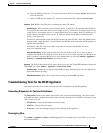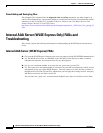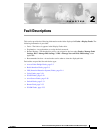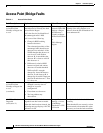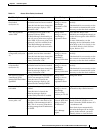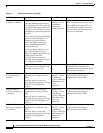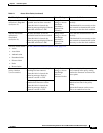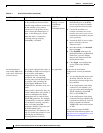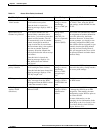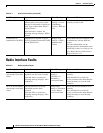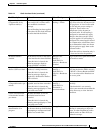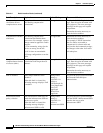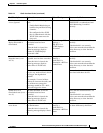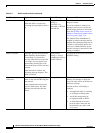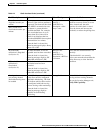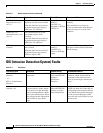
2-7
FAQ and Troubleshooting Guide for the CiscoWorks Wireless LAN Solution Engine
OL-8376-01
Chapter 2 Fault Descriptions
Access Point /Bridge Faults
MIC is disabled for the
VLAN number
MIC is not enabled for the selected
VLAN on the access point.
When the fault is cleared, the
following message displays: MIC is
enabled.
Manage Fault
Settings > Access
Point/Bridge
Policies > MIC per
Vlan
Log into the access point and enable
the VLAN. Then, using the WLSE
fault settings, enable the MIC for that
VLAN.
Radar Detected on
Channel origChannel
On its current channel, the AP
detected likely contention with a
radar device, so it needs to leave that
channel and find another. The AP
will automatically scan for another
channel, but might be unable to
accept associations for one minute.
This one minute delay is the required
scan time on another Dynamic
Frequency Selection channel that
must elapse before the AP can accept
associations.
When this fault is cleared, the
following message displays: No
radar detected on new channel
newChannel
Manage Fault
Settings >
Radio-802.11a
Policies > Dynamic
Frequency
Selection (DFS)
The WLSE will automatically handle
the assignment of another channel for
those APs affected by the Radar
Detection. However, if these faults
become common, you should re-run
Assisted Configuration (RPG) soon
after a DFS event has occurred (or just
manually deselect the DFS channel
from the Assisted Config Wizard).
This will reorganize the site to avoid
the affected channel and make future
conflicts likely.
Vlan WEP key length
policy violation
The WEP key length for the selected
VLAN setting has been violated.
When this fault has been cleared, the
following message displays: Vlan
WEP key length is ok.
Manage Fault
Settings > Access
Point/Bridge
Policies > WEP
Encryption per
Vlan
Make sure the WEP key length
selected in the policy setting matches
the access point settings.
WDS appears down. The WLSE failed to receive “keep
active” messages from the WDS.
This happens when the WDS is down
or when the network is down.
Manage Fault
Settings > WDS >
WLSE-WDS Link
Status
Check the network connectivity, and
the WDS status.
WDS Registered with
another WLSE
(IPaddress)
The WDS is registered with a
different WLSE.
Manage Fault
Settings > WDS >
Authentication
Failures
Determine which WLSE is supposed
to manage that WDS from an RM
perspective. Then modify the wnm
configuration on the WDS to point to
the correct WLSE.
For more information, see the
managing devices information in the
online help or the User Guide for the
CiscoWorks Wireless LAN Solution
Engine, Release 2.13.
Table 2-1 Access Point Faults (continued)
Fault Description Explanation Related Setting Recommended Action



